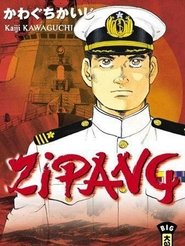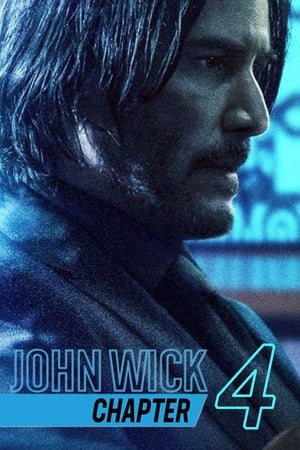Sinopsis
Una moderna unidad militar de la Fuerza de Defensa Japonesa es transportado a 1942 por una extraña tormenta. Deberán decidir si deben o no cambiar el curso de la historia involucrándose en la Segunda Guerra Mundial.
Emitir
Episodios
Zipang: Temporada 1

Future Departure
No hay descripción disponible.

Midway
The Mirai finds itself in the middle of the Combined Fleet formation of the night before the Battle of Midway. First, Mirai is signaled by the Yamato, the Combined Fleet flagship, then two destroyers attempt to block its path, but it successfully eludes the Imperial Japanese fleet using superior acceleration from modern gas turbine propulsion. Reluctantly, the crew realizes that they have traveled sixty years into their past, to the eve of the Battle of Midway. They witness the battle but make the difficult decision to not become involved so as not to affect history. Captain Umezu decides that, since they obviously cannot enter Pearl Harbor to reprovision as originally planned, they should head back to Yokosuka and hope that they may encounter the anomaly again on the return trip.

Person Adrift
Kadomatsu rescues an Imperial Japanese Navy officer, Lt. Commander Kusaka, from a sinking seaplane. The Mirai’s crew is split over the fact that they may have changed history. The Mirai is discovered by an American submarine, USS Guardfish (SS-217).

Battle of the Future
No hay descripción disponible.
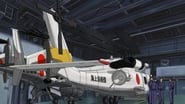
Souka`s Choice
No hay descripción disponible.

Attack Order
The VTOL recon plane damages the two fighters and forces them to ditch without injuring their pilots, but its weapon systems officer is killed, the Mirai’s first casualty. Kusaka proposes that the Mirai go to Japanese-occupied Singapore, rather than Japanese mainland, to refuel and reprovision, He believes that he can arrange the resupply, armed with forged documents and fake currency produced on board the ship. Having examined Japanese Navy's personnel records in Mirai's record room extensively, Kusaka is certain that there is no one in Singapore who would recognize him.

Malay Railway
Kadomatsu and Kusaka travel by the Malayan Railway to Singapore, while the Mirai hides in the Anambas Archipelago. Kadomatsu gets a view of the colonized people and has a close call with a brutal Kempeitai inspection. In Singapore, Kusaka requisitions a tanker to carry supplies for a "special mission" for the navy. While waiting for the ship to sail, Kadomatsu and Kusaka attend a party. There, Kusaka is shocked to run into Lt. Tsuda, his kohai from the naval academy, who, according to Mirai's records, should not have been anywhere near Singapore. He remarks to Kadomatsu that this is no longer his past, since the actual events are already diverging from the records of Mirai's past — as evidenced by Tsuda's unexpected appearance in Singapore. Kadomatsu refuses to believe this and punches Kusaka in the face. In the meantime, the Mirai is spotted by a local fisherman.

Pursuer
The two from the Mirai arrange for a tanker loaded with fuel and provisions to rendezvous with the destroyer. But Lt. Tsuda, having recognized Kusaka and realizing something odd is afoot, has found out about the ship. After being informed of the fisherman's discovery of a hidden Japanese warship in Anambas, he realizes that his encounter with Kusaka, mysterious purchases of fuel and foodstuffs on the black market, the unexplained "special mission" involving the tanker, and his mission regarding the mystery ship are all connected. He has the tanker’s crew replaced with his own men and confronts Kusaka after the ship sets sail.

Deadline
Tsuda reveals that, in addition to the crew of the tanker, he has put together a sizable task force at Singapore around the cruiser Kashii for dealing with the mystery ship that he has been ordered to investigate, should it become necessary. However, Kusaka and Kadomatsu convince Tsuda that force will not work and ensure that the Mirai is fueled and provisioned accordingly. Tsuda has an opportunity to tour the Mirai but has difficulty coping with knowledge of the future. Kusaka tells Tsuda that the future is not fixed as recorded in Mirai's history, since its very presence is actively forcing changes, and that their job is to ensure that these lead to a "better" future for Japan. Specifically, he informs Tsuda that he intends to convince Captain Umezu and Admiral Yamamoto to change the outcome of the Battle of Guadalcanal. Captain Umezu accepts Kusaka's suggestion, though with much difficulty, and calls for a meeting of the senior officers to plan their moves.
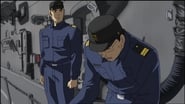
Interchange
Lt. Commander Oguri and Lt. Satake visit the crew of the tanker and the sailors from the 21st and 20th centuries have an opportunity to learn about each other — and Oguri consequently arrives late and drunk to the staff meeting called by Captain Umezu. Plans for Guadalcanal are developed. Kikuchi thinks the Mirai should intercept the U.S. fleet and inflict enough casualties to convince the latter not to press the attack but Kusaka argues that Americans would not give up so easily and instead proposes to fly to the Japanese base at Truk to convince Admiral Yamamoto to withdraw Japanese forces instead so as to avoid the battle.
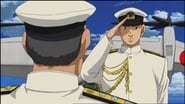
Island of Guadalcanal
Kusaka is flown in the Umidori to meet Yamamoto at Truk Island. The IJN staff find the idea of a ship from the future hard to believe, but the technologically advanced nature of the Umidori is indisputable. American Marines in the attacking task force discuss stereotypes of the Japanese soldiers and get a more realistic view from their commander, General Alexander Vandegrift. At a private meeting with Admiral Yamamoto, Kusaka suggests that Japan should withdraw all the way to Manchuria, now that they have already broken the myth of European invincibility. Yamamoto replies by asking whether that means Japan should flee from the fight, Kusaka replies that he has another plan — which is left hidden from the viewers. Admiral Yamamoto then asks Kusaka what has happened to him on the Mirai, to which Kusaka replies that the experience opened his eyes as a Japanese. When Yamamoto asks what happened to him as a naval officer, Kusaka hands in his dirk in implicit resignation from the navy.

Arrow of Sagittarius
A landing party from the Mirai on Guadalcanal has close calls with both the Japanese on the island and with the attacking American forces. The Mirai witnesses the Battle of Savo Island, where the Allied naval force covering the landing is destroyed by the Japanese Eighth Fleet under Admiral Gunichi Mikawa. When the Japanese fleet withdraws without attacking American transports, the crew of Mirai think history as they know it — in which the fear of a possible air attack from US carrier forces caused the Japanese fleet to withdraw prematurely — remains unchanged, but Admiral Mikawa remarks to his staff that he is in fact aware that U.S. carriers are far away and cannot intervene. The withdrawal, in fact, is a part of a larger strategy. General Vandegrift receives a message from the Mirai warning that, at 3 am, an "arrow of Sagittarius" will strike his camp as a demonstration of their power and that his men should withdraw immediately if they value their lives.

Country of Gold
Kadomatsu and his landing party use a laser designator to guide a blank Harpoon missile to strike the American supply depot, an attack which harms no one but demonstrates their ability to do so. But the Americans do not retreat as the Mirai’s crew expect, but instead send out patrols into the jungle to ferret out suspected Japanese infiltrators. Meanwhile, a large Japanese fleet unrecorded in history, led by the battleship Yamato, arrives to shell the American Marines. Kusaka radios Kadomatsu from Umidori — now stowed in Yamato's hangar — to reveal his vision for a new country that is neither the militaristic empire of his time nor the defeated Japan of the future. He calls his ideal land Zipang. He reminds Kadomatsu that they are caught up in a war and that Japan cannot just withdraw from the fight without striking some blow at the Americans.

Clash!
The Yamato fires on the American forces on Guadalcanal, but the Mirai uses its Aegis combat system and Sea Sparrow missiles to intercept and destroy the first wave of shells in flight. However, the Mirai crew are aware that they cannot keep intercepting shells, as the Yamato has hundreds of shells to fire, while the Mirai is limited by both the technology and the supply of missiles. Lt. Commander Kikuchi suggests that, if Yamato were to keep firing its main battery, the only way the Mirai can stop the shelling would be to disable the Yamato itself. After tense several minutes during which the Mirai aims its missiles at the Yamato, Admiral Yamamoto agrees to withdraw his battleships and evacuate Japanese personnel from Guadalcanal. In the meantime, Lt. Tsuda prepares to commit Seppuku with his Dirk (since he heard that the Mirai has intercepted the Yamato's rounds, viewing it as a battle and viewing himself already as a prisoner of war), as the Mirai's female medical officer Lt.

The Living and the Dead
On Kusaka’s advice, Yamamoto calls off the attack and orders the withdrawal from Guadalcanal to begin. As Lt. Tsuda worries about himself committing suicide and calling himself a "pathetic man", Lt. Momoi calms him down, preventing him committing suicide by stating that there is no problem for being a pathetic man and that he is better than those who do not value human lives, then embracing him, making Tsuda drop his Dirk and faint. While trying to reach their helicopter for extraction, the Mirai’s landing party is forced into close combat with an American Marine patrol. They kill all the eight Marines, but the taking of other human lives leaves them in shock. It is especially hard on Kadomatsu.

Major Okumura's Will
The Mirai landing party assists in the evacuation of the Japanese engineers from Guadalcanal. Kadomatsu goes into the jungle alone to look for stragglers. He encounters Lieutenant Commander Okamura (who is identified as a major in the fan-dubbed version and as a lieutenant in the official Geneon version, but as a member of Japanese Navy ground forces, he would be correctly ranked at a lieutenant commander). Okamura displays admirable bravery and dedication by staying behind to look for the rest of his men scattered in the jungle.

Zipang's Movement
The Mirai enters the Japanese naval base at Truk Island under Admiral Yamamoto’s sponsorship and the crew looks forward to a shore leave. The Army and the Navy disagree about the operation to recapture Guadalcanal and a delegation from the Army insists that the battle for Guadalcanal resume, with an elite army regiment under Colonel Kiyonao Ichiki, en route from Guam, leading the way. After the meeting with the army officers, Admiral Yamamoto flies into rage and orders his staff to devise a plan that could convince Mirai's crew to join his cause, saying that the ship is essential for avoiding needless sacrifices. Captain Umezu meets Admiral Yamamoto who suggests that the Mirai base itself at Yokosuka, its home port in the 21st century, so that the presence of both the ship and its crew can help change the minds of the contemporary Japanese and make them amenable to accepting an early peace with the Americans. Lt. Col.
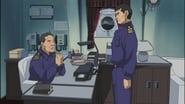
Reunion
Kadomatsu learns that the operations on Guadalcanal are to resume — under an imperial decree — and blames Kusaka for this development. He goes ashore with Lt. Tsuda to talk to Kusaka — and is shocked to see him in a car heading towards the airfield with Lt. Colonel Tsuji. Kadomatsu tries to stop Kusaka but fails. As Mirai prepares to sail to Yokosouka, Lt. Commander Taki, a naval staff officer, plots with Admiral Matome Ugaki, the Combined Fleet Chief of Staff and a hardliner in the navy, to destroy the Mirai by arranging to have radio messages about her movements transmitted in a code that they know has been cracked by the Americans — so that it would be destroyed by an American, rather than Japanese, attack. Taki remarks that he is working under orders from someone high in the Japanese naval command, whose identity he cannot reveal.

Another Staff Headquarters
When some of the Combined Fleet staff (specifically Admiral Ugaki) balk at the idea of sending badly needed destroyers to escort the Mirai, Lt. Commander Taki proposes that a new submarine, the I-21, be sent instead, with himself on board to observe. Yamamoto reminds Taki that he is essentially protecting Japan's future — and without Japan, there is no navy. However, Taki retorts — silently — that without the navy, there can be no Japan. In Japan, Kusaka and General Ishiwara develop a plan to create Kusaka’s vision of Zipang, an undefeated Japan, with its economic heartland in Japanese-dominated Manchuria. Specifically, Kusaka reveals the 1959 oil strike at Daqing, Heilongjiang Province, in Manchuria, which could supply many times Japan's needs for decades.
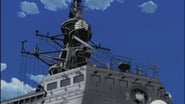
E-No. 21
Kadomatsu goes to the I-21 to consult about an approaching scout plane the Mirai has detected. Taki takes Kadomatsu prisoner and the I-21 submerges, leaving the Mirai’s crew confused and unsure about what to do as time runs out. The mystery plane is indeed American, but Mirai uses its ECM system to jam the radio waves and prevent the pilot from reporting back. Nevertheless, Commander Hutton correctly suspects that a distortion field that suddenly appeared on USS Wasp's radarscope is the work of the mysterious Japanese warship and recommends an attack. The episode ends as the USS Wasp launches a massive air strike against the Mirai.

1 against 40
On board the I-21, Kadomatsu tries to get a warning to the Mirai via Morse code but is stopped by Taki. At first, Mirai attempts to leave the scene, rather than stand and fight, but Taki forces the issue by ordering the I-21 to surface so that it would be left vulnerable to an air attack. Rather than leave I-21 to be attacked by the Americans, Captain Umezu decides to stay around and face the attack. Oguri thinks they should engage the Americans afar, taking advantage of their technological advantage, but Kikuchi argues that they should wait until the range closes, since the supply of the long range Standard missiles is limited. In fact, Kikuchi thinks he can spare lives by demonstrating Mirai's firepower to destroy only a fraction of the American strike force, so that the rest would be frightened away. The strike force from the USS Wasp finds the destroyer. Using its advanced weapons, the Mirai shoots down two-thirds of the American aircraft in less than a minute.

Warning
The JDS Mirai monitors radio traffic indicating that the Wasp is preparing a second strike. Since the radar and the main cannon are damaged, Gunnery Officer Kikuchi recommends launching a Tomahawk missile to destroy the Wasp rather than wait for the second wave to strike. Lt. Commander Oguri suggests instead that a Harpoon missile be used instead to damage the flight deck instead. Kikuchi counters, however, that during the Battle of Coral Sea, USS Yorktown (CV-5) was back in operation only after three hours' repairs after a similar damage, and besides, since JDS Mirai came back in time, Allied forces have constantly seen it as an enemy and sought to destroy it, Mirai can't run forever and hold back punches if its crew are to survive. Captain Umezu agrees but first sends a warning to the Wasp and orders that the Tomahawk be self-destructed if the American ship calls off the second attack. Unfortunately, the American Admiral Noyes believes the warning is a bluff.

Sinking of WASP
The Tomahawk missile hits the Wasp. Its explosion and resulting secondary explosions from the carrier’s munitions and armed aircraft destroy the ship and it sinks with heavy casualties, leaving Admiral Noyes and Captain Gray dumbfounded as they join the survivors on board lifeboats. On the opposite side, Gunnery Officer Kikuchi is racked with guilt over his decision, even though he still believes it the only acceptable option. On the I-21, Lt. Commander Taki wants to launch torpedoes to sink the Mirai, but Kadomatsu says the sub will have to surface to make the attack, since its batteries are nearly dead from following the destroyer at high speed submerged. Surfacing will make it vulnerable to retaliation. Captain Shimamoto, the submarine's commander, supports Kadomatsu’s statement, even though it is not really true.
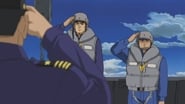
The Dead and the Living
Following the previous episodes' events, people on all sides are having hard time coping with what has so far transpired. On a U.S. destroyer carrying the survivors of the battle against the Mirai, Commander Hutton is a drunken wreck, seized by the nightmares of the battle and melancholy over the many subordinates he lost. On the Mirai, the crew is also coping with the shock of the battle and loss of their comrades — to the point that Gunnery Officer Kikuchi had to be sedated. On Guadalcanal, where the Ichiki detachment has just been wiped out, Lt. Commander Okamura is tending to a group of tattered Japanese survivors. The survivors include a very dejected Lt. Colonel Tsuji. Okamura convinces Tsuji that he must report to the Imperial GHQ about the difficulties that the Japanese troops are facing on Guadalcanal and urge a prompt and total evacuation to save the lives of thousands.

Return
Upon "returning" to Yokosuka, the crew of Mirai find that the navy has arranged to have them dock away from the harbor, under the guns of a naval artillery battery. Feeling suspicious, Mirai contacts the Yokosuka Naval Base to demand that someone with real authority be sent to negotiate the conditions of their stay. The navy brass are divided over what to do, but Admiral Yonai enters the conference room to volunteer himself as the envoy and goes to Mirai alone. On board the Mirai, Yonai remarks to Captain Umezu and Kadomatsu that he'd rather see Mirai reduced to a pile of scrap metal. He reminds them that they are not of this era and that it is best that Japan lose the war to awaken her people from the allure of imperialism and militarism. Even if the defeat costs lives of millions, it is necessary to shock the Japanese people into rejecting the military dictatorship so that Japan could prosper for the next 100 years.

The Place I Ought to Return
No hay descripción disponible.
No te pierdas miles de películas y programas de TV adicionales, como:
Obtenga Netflix internacional ahoraNo te pierdas miles de películas y programas de TV adicionales, como:





